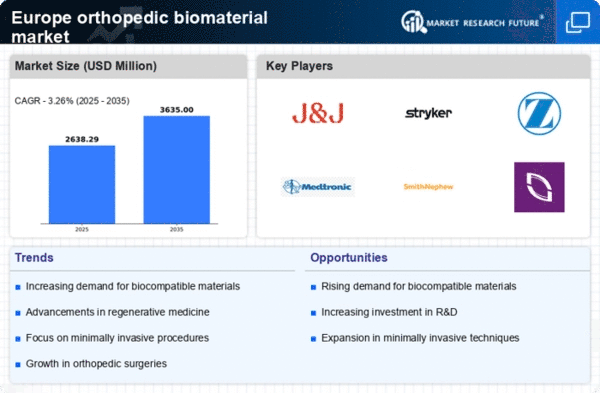Market Trends
Key Emerging Trends in the Europe Orthopedic Biomaterial Market
The market is influenced by the rising incidence of orthopedic conditions, including osteoarthritis and fractures, across Europe, the Middle East, and Africa. This demographic shift towards an aging population contributes to a growing demand for orthopedic biomaterials used in joint replacements, spinal surgeries, and other orthopedic procedures. Technological developments of biomaterials are the prime factors which help in market trends. Advancements in the construction of biocompatible materials including ceramics, polymers and metals are improving functionality and life span of orthopedic implants. This tendency is essential in achieving the growing requirements to extend implant lifespan and functionality. In EMEA, adoption of minimally invasive orthopedic surgeries is on the rise. This is due to the fact that there are more surgical techniques available as patients look for minimally invasive treatment options with shorter recovery times. There is also a growing demand for biomaterials which support these advanced procedures in surgery. The use of biomaterials that ease minimally invasive procedures is increasing. The orthopedic implant market is witnessing strong growth with growing number of joint replacement surgeries, spinal procedures and trauma. There is an increasing need for biomaterials capable of performing at a high level and compatible with these implants. In the developed areas of Europe and Middle East, where healthcare infrastructure is well established this trend dominates. In orthopedics, a significant focus is placed on regenerative medicine which promotes the creation of biomaterials that facilitate tissue restoration and recovery. Biomaterials, including growth factors and stem cells as well as tissue- engineered constructs have received interest for their capability to enhance recovery after orthopedic interventions. Strategic collaboration and partnerships have been carried out by major players in the EMEA Orthopedic Biomaterial Market. All these alliances between biomaterial manufacturers, medical device companies and research institutions are focused on accelerating innovation in the field of development novel bio-material solutions that will satisfy both an orthopedic surgeon as well as a patient. The market is influenced by the change towards environmentally friendly and sustainable products, more specifically biodegradable biomaterials. Needless to mention, bioresorbable implants that gradually dissolve in the body reduce patients’ risk of developing new tumors associated with surgical removal. The orthopedic biomaterial market is faced with changes in their policies and reforms of healthcare systems within the EMEA region. Adoption trends of orthopedic biomaterials are driven by a shift in reimbursement policies, regulatory frameworks and government initiatives that intend to improve the healthcare infrastructure as these factors play an imperative role in shaping market dynamics. The COVID-19 pandemic has had a multifaceted impact on the orthopedic biomaterial market. While elective surgeries were temporarily halted during certain periods, the resumption of regular healthcare services has led to a rebound in the demand for orthopedic biomaterials. Additionally, the pandemic has highlighted the importance of resilient and adaptable biomaterial solutions in the face of healthcare challenges.










Leave a Comment